Introduction
In the competitive landscape of estate planning, understanding the target audience is crucial for effective marketing. As demographics shift and life transitions become more prevalent, particularly among individuals over the age of 50, estate planning firms must adapt their strategies to meet specific needs and concerns.
With a significant portion of the population lacking essential estate planning documents, it becomes imperative for practitioners to craft campaigns that resonate with potential clients. By leveraging data analytics and targeted marketing efforts, firms can not only address common barriers to estate planning but also simplify the process in the eyes of consumers.
This article explores proven marketing strategies, the importance of digital tools, and the role of educational content in attracting and retaining clients, ultimately guiding estate planning professionals toward a more effective and responsive approach in their marketing endeavors.
Understanding Your Audience: The Key to Effective Estate Planning Advertising
Grasping your audience is crucial for effectively promoting estate planning advertising services. A significant portion of clients are individuals over the age of 50, many of whom are navigating pivotal life transitions such as retirement, health challenges, or bereavement. Recent surveys indicate that a notable 23% of Americans feel that nothing would motivate them to create a legacy plan.
Furthermore, only 27% of Hispanic adults currently possess a will, as noted by LegalZoom staff. This statistic underscores the importance of targeting specific demographics. Identifying the primary concerns of this demographic—such as the desire to avoid probate, minimize tax liabilities, and ensure the financial security of their loved ones—can greatly inform estate planning advertising strategies.
Furthermore, it is crucial to recognize that typical reasons for not finalizing a plan include:
- A lack of time
- Uncertainty about which documents are necessary
By leveraging data analytics and conducting targeted surveys, attorneys can tailor their estate planning advertising campaigns to effectively address these specific pain points. The case study titled ‘The Simplicity of Asset Management’ illustrates that contrary to common belief, organizing one’s affairs does not have to be a lengthy or complicated process.
Clarifying the understanding of property management can motivate more people to take steps and finalize their arrangements. This strategic alignment not only connects with prospective customers but also boosts engagement and conversion rates, promoting a more adaptive promotional strategy in the changing environment of property management.
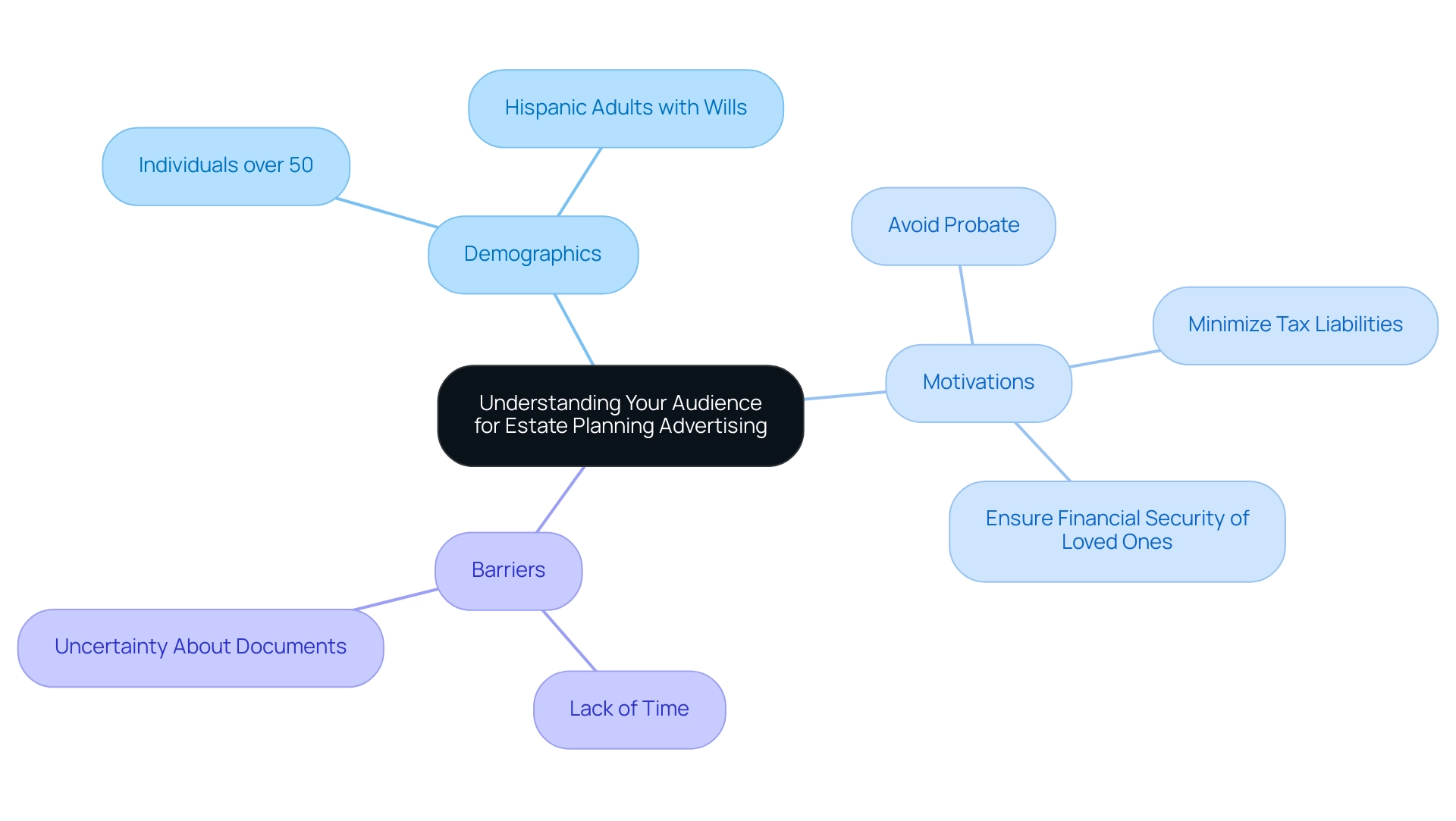
Proven Marketing Strategies to Attract Estate Planning Clients
To effectively attract individuals seeking estate planning advertising, it is crucial to implement a range of strategic marketing approaches. A foundational element is creating a strong online presence, which starts with a well-optimized website that clearly displays your services, testimonials, and relevant case studies. Search engine optimization (SEO) plays a vital role in enhancing your visibility; data indicates that improved SEO can increase website traffic by up to 14.6%, significantly boosting the likelihood of being found by potential clients.
Furthermore, with almost 45% of Americans aged 30-50 investigating online property management resources as of 2023, adjusting to this trend is essential for companies. As Gentreo states, “By making planning for assets accessible to all, Gentreo is helping Americans take control of their futures and protect their loved ones from unnecessary legal and financial challenges.” Leveraging social media platforms, such as Facebook, LinkedIn, Instagram, and X/Twitter, enables estate planners to engage in estate planning advertising campaigns that effectively reach specific demographics.
Regularly sharing valuable content not only enhances online presence but also establishes thought leadership. Additionally, incorporating email promotional strategies can nurture leads through informative newsletters, providing ongoing value and encouraging engagement. It is also advantageous to share this information with peers to promote a collaborative approach to promotion.
By implementing these estate planning advertising approaches, property management firms can position themselves favorably in a competitive environment, ultimately attracting and retaining customers.
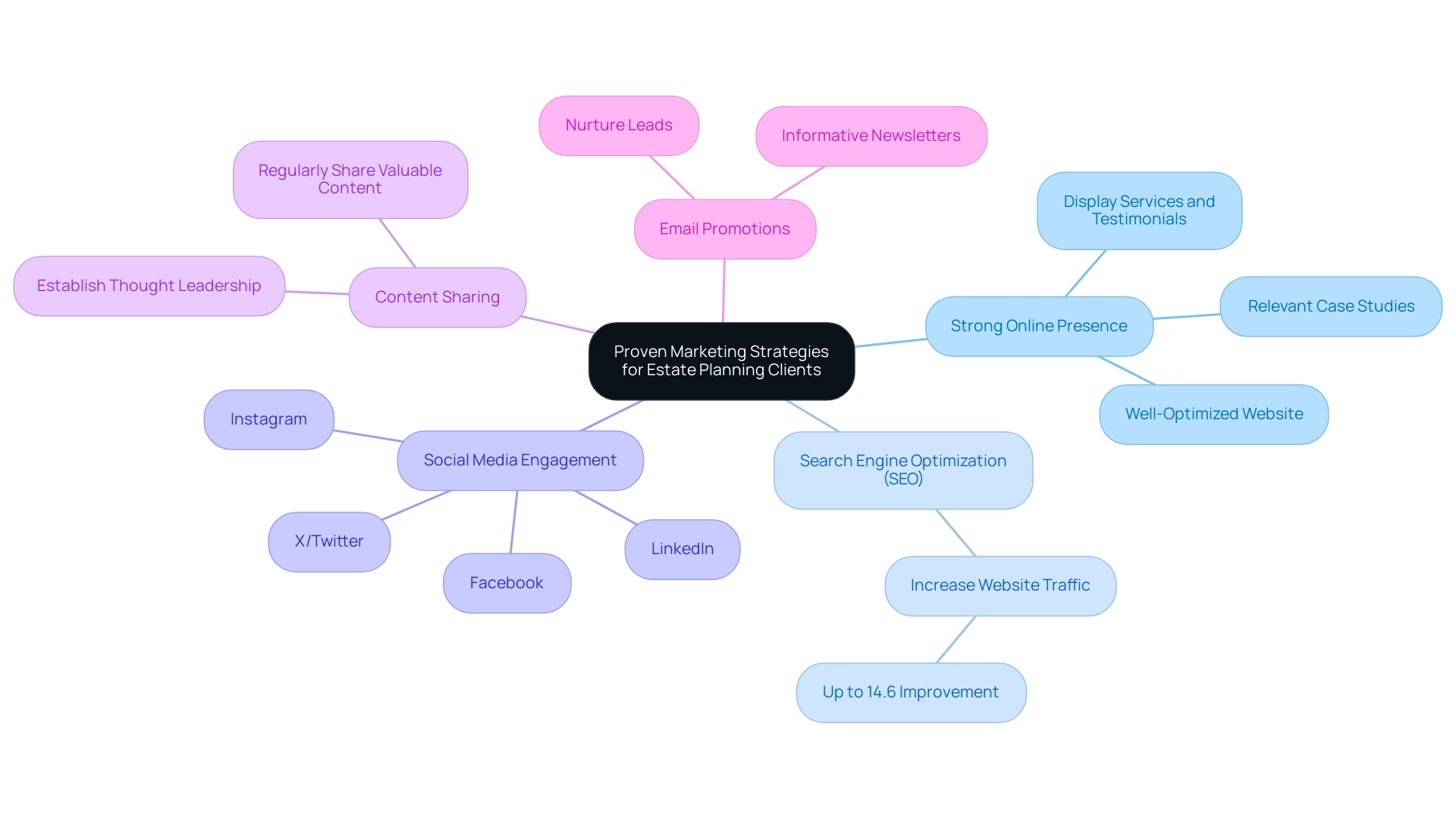
Leveraging Digital Marketing Tools for Client Acquisition
Utilizing digital marketing tools like Pay-Per-Click (PPC) advertising and Search Engine Optimization (SEO) is crucial for improving the visibility of firms focused on asset management. PPC campaigns facilitate targeted estate planning advertising by concentrating on specific keywords related to estate planning services, ensuring that ads reach potential customers actively seeking relevant information. In parallel, a comprehensive SEO strategy involves meticulously optimizing website content, metadata, and blog posts to improve rankings in search engine results.
This dual approach not only drives immediate leads through PPC but also fosters long-term interest by attracting organic traffic. Notably, 32% of law firms indicate plans to enhance their localized SEO tactics, reflecting a growing acknowledgment of its significance in acquiring customers. According to Caroline Vahue, an Account Manager at Sixth City Marketing, effective utilization of these digital tools can significantly impact customer engagement and conversion rates.
She highlights that by combining both PPC and SEO strategies in their estate planning advertising, firms can attain a balanced approach that effectively captures diverse client inquiries. Furthermore, a data-driven approach is exemplified by the fact that 51% of law firms utilize Google Analytics to guide their budget decisions, showcasing how analytics tools can inform strategic choices. Additionally, insights from other sectors, such as dental and manufacturing, reveal that many firms are leveraging similar digital marketing strategies, further validating their effectiveness across various industries.
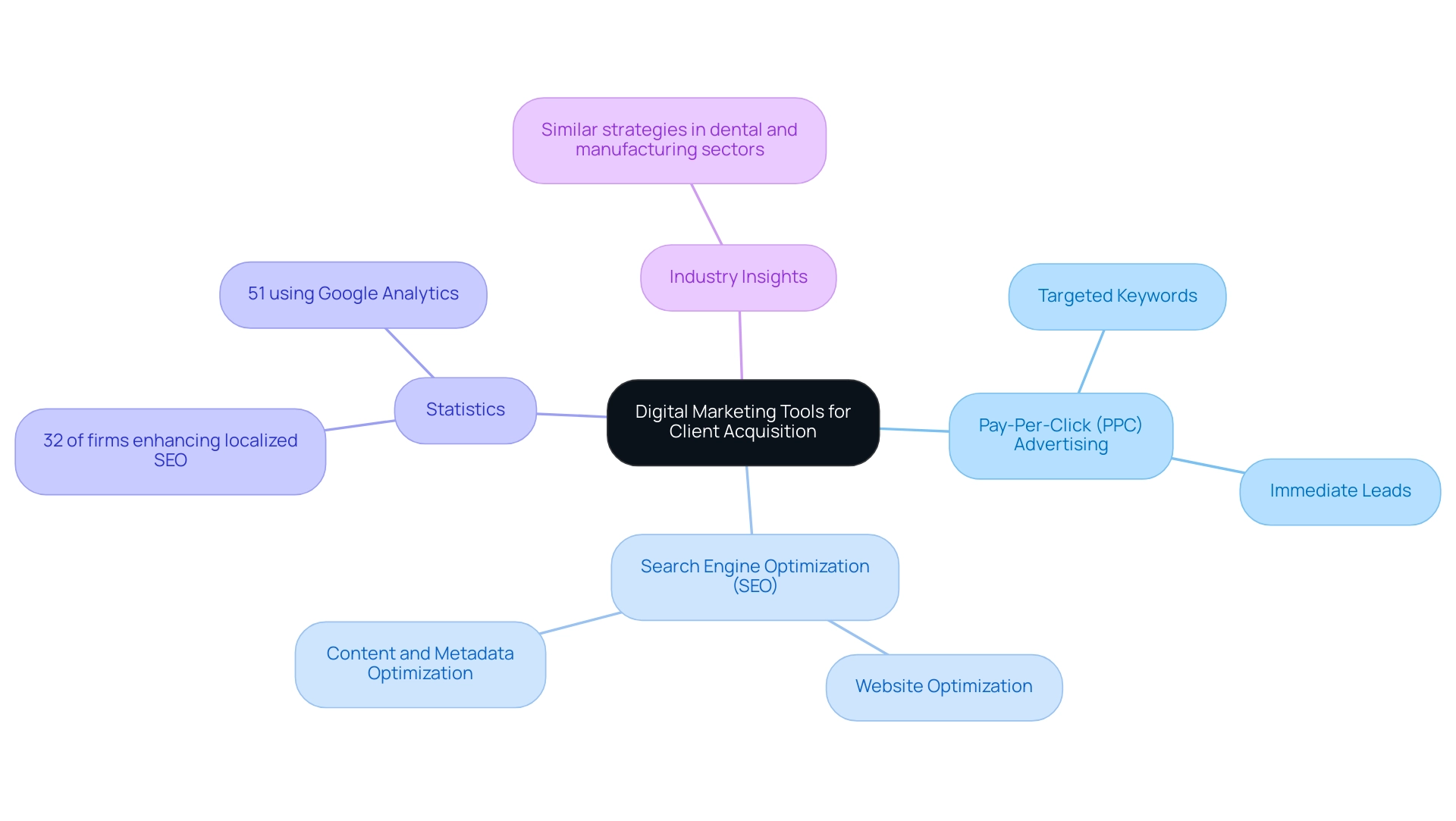
Building Trust Through Educational Content and Resources
Creating educational materials like blog articles, eBooks, and webinars is essential for establishing authority in the property management field. Recent trends indicate a 12 percent increase in individuals believing that having a Will by the age of 35 is essential, highlighting the effectiveness of estate planning advertising in promoting awareness of its importance. Focusing on subjects that resonate with prospective customers, such as:
- ‘The Importance of Having a Will’
- ‘How to Minimize Estate Taxes’
can greatly enhance trust in your expertise in estate planning advertising.
As Lynda McMillen, Director of Development at Sunnyside Communities, noted,
The company is very attentive and quick to respond to our needs. We have been very happy with their services over the years. Highly recommend.
This underscores the positive effect of responsive educational initiatives on trust. Moreover, it is crucial to contemplate the cessation of HEMS terminology in trusts, as this method can result in improved outcomes for individuals by clarifying the language utilized in legal documents. Hosting workshops or informational sessions within the community can solidify your presence and authority.
Studies indicate that delaying tasks is a major obstacle to financial arrangements, particularly among higher-earning individuals, with 63% of those making over $80,000 identifying it as the primary cause for not having a will. This highlights the importance of focused educational initiatives, such as estate planning advertising, that tackle these socioeconomic factors and involve potential participants. By offering impactful educational material, you can motivate people to prioritize their asset management requirements, while also emphasizing the crucial function of legal professionals in navigating property regulations and minimizing tax liabilities.
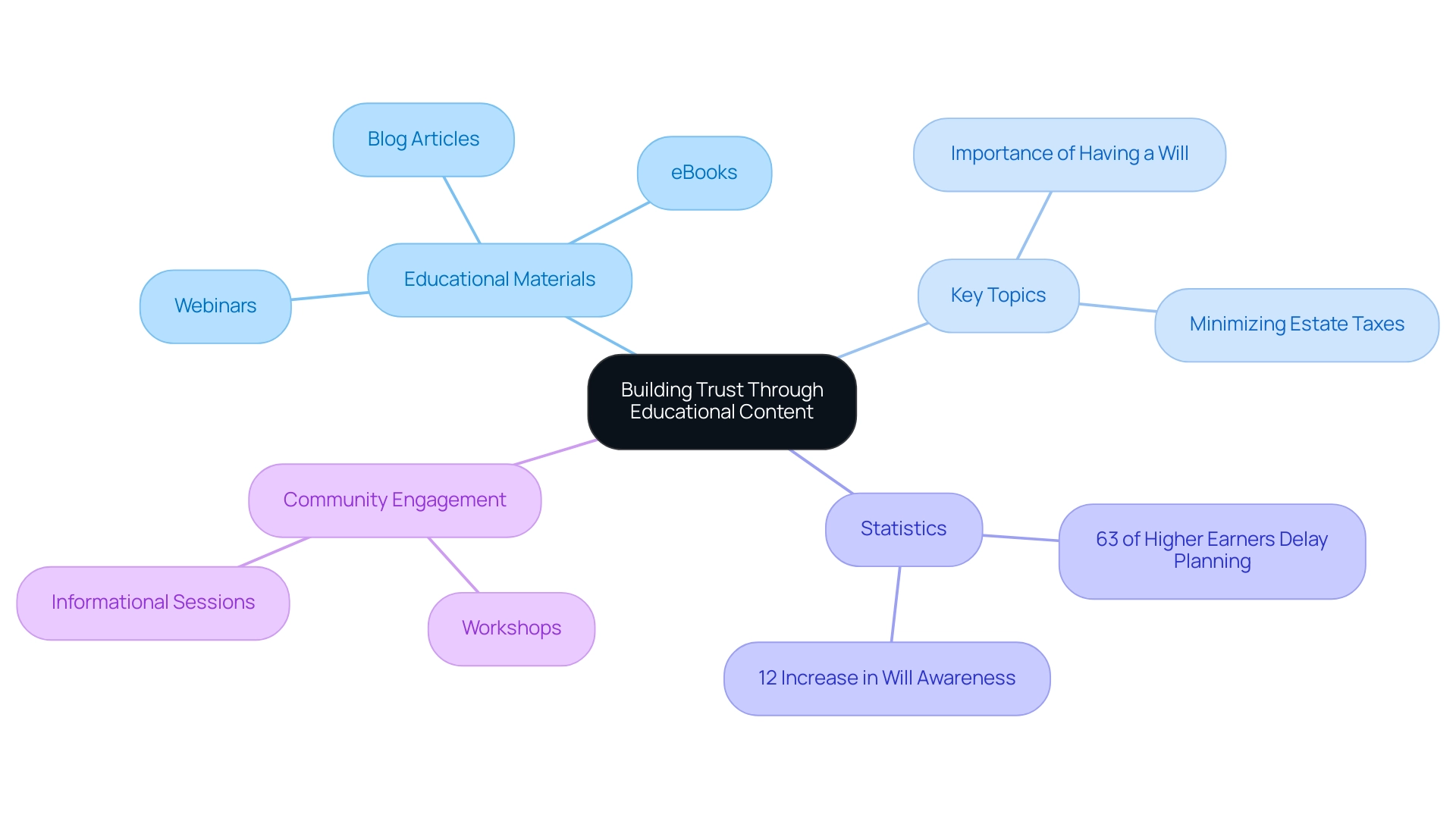
Enhancing Visibility Through Local Marketing and Community Engagement
Successful local promotion is essential for firms focused on attracting customers within their community. A foundational step involves optimizing your Google My Business listing, which significantly enhances local search visibility. Engaging with potential customers can also be achieved through active participation in community events, sponsoring local organizations, or hosting complimentary seminars on estate planning advertising topics.
Such initiatives not only foster community engagement but also position your firm as a trusted local resource. Furthermore, it’s significant that 46% of customers of legal firms indicate making their initial contact by phone, highlighting the importance of local visibility and accessibility. Furthermore, cultivating relationships with local financial advisors and accountants can yield valuable referral opportunities.
As Gerrid Smith, founder of Fortress, states, ‘Success can be measured through key performance indicators such as increases in organic traffic, higher search engine rankings, and improved conversion rates from website visitors to customers.’ By establishing a strong local presence and integrating both digital and traditional marketing channels, as highlighted in the case study ‘Choosing Your Promotion Tactics,’ your firm can enhance visibility and appeal to clients who prefer working with professionals in their community.
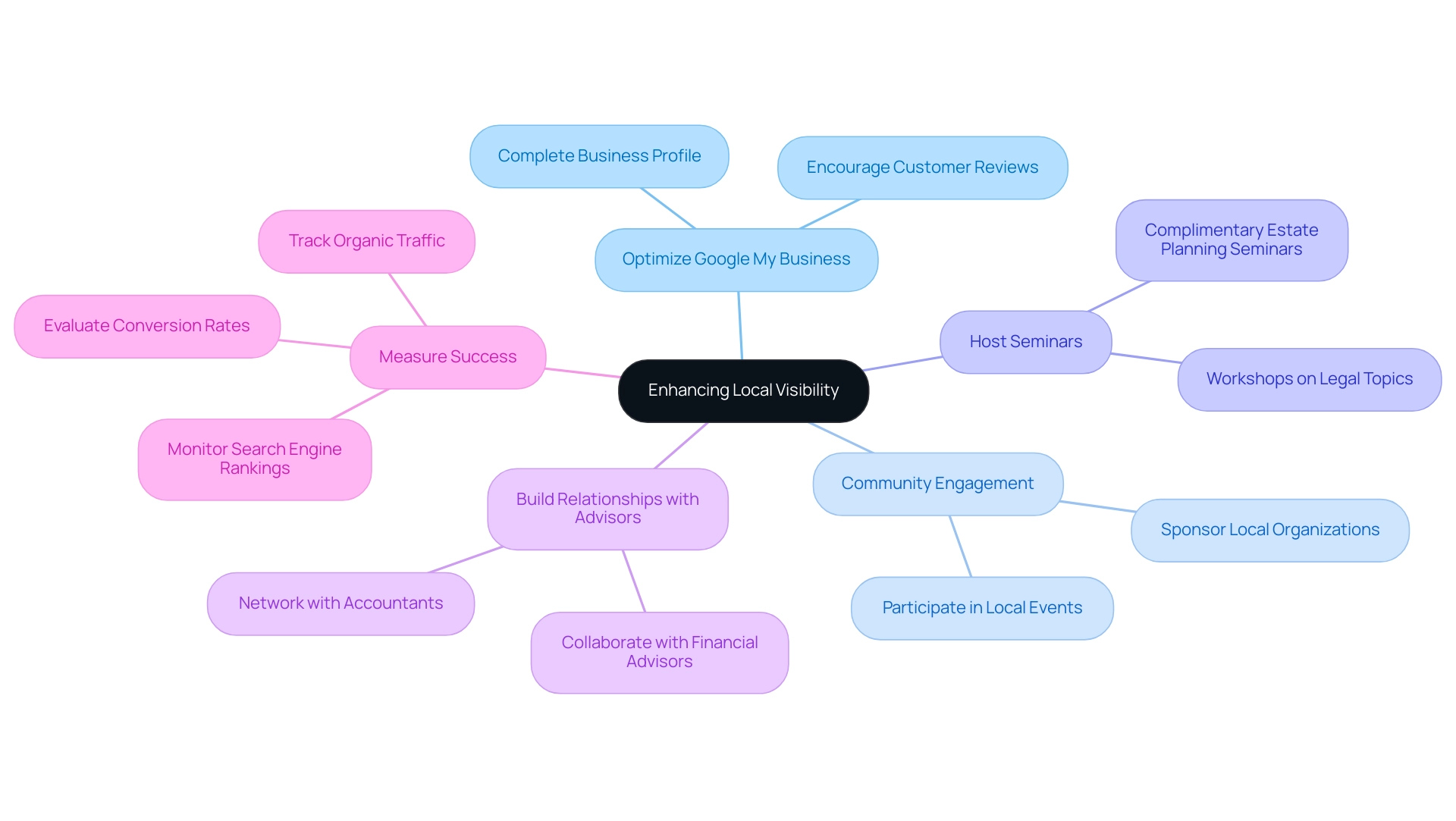
Conclusion
Understanding the specific needs and concerns of the target audience is crucial for estate planning firms aiming to improve their marketing efforts. As highlighted, individuals over 50 face numerous life transitions and often lack essential estate planning documents. By addressing the barriers that prevent these individuals from creating estate plans, such as time constraints and uncertainty about the process, firms can better engage potential clients and simplify their marketing messages.
Implementing proven strategies, such as:
- Optimizing online presence
- Utilizing digital marketing tools like PPC and SEO
- Creating informative educational content
can significantly enhance visibility and attract clients. The importance of building trust through valuable resources cannot be overstated, as it establishes authority and encourages individuals to prioritize their estate planning needs.
Furthermore, local marketing efforts, community engagement, and strong referral relationships with financial professionals are vital components in reaching potential clients effectively. By combining these approaches, estate planning firms can create a comprehensive marketing strategy that resonates with their audience, ultimately leading to increased client acquisition and retention. Adapting to the changing landscape and focusing on the specific needs of clients will ensure long-term success in the estate planning sector.

